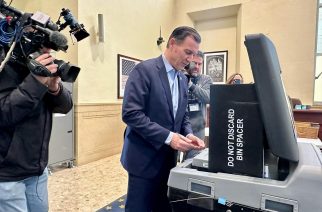
Bills would also reduce fees and paperwork
for craft brewers and small wholesalers
The governor is introducing legislation that would overhaul the state’s blue laws and reduce paperwork for craft brewers and cut down the fees paid by small wholesalers to further expand New York’s growing brewing, distilling and wine making business.
The bills follow specific recommendations by a panel of big and small brewers across the state, wineries, distilleries and associations representing the restaurant and hospitality industries.
Gov. Andrew Cuomo announced the legislation at a ribbon cutting ceremony the Three Heads Brewing in Rochester on Wednesday. The brewery is expected to begin full operations next week and hire an additional 15 new employees. The $4 million project includes a 15,000 square foot space for brewing, a 30-barrel fermenter to allow Three Heads Brewing to offer different seasonal and one-off beers every three weeks in the 2,100 square foot tasting room.
“The fact that we are about to open a 20,000 square foot brewery owes a great debt of gratitude to [Cuomo’s] initiatives,” said Dan Nothnagle, CEO of Three Heads Brewery. “We look forward to representing Rochester and New York state on the national brewing stage.”
If passed by the Legislature, the most noticeable change would be the ability for bars and restaurants to serve alcohol between 8 a.m. and noon on Sundays with a proper permit, available as part of the new proposed law. Currently, establishments are prohibited from selling alcohol before 12 p.m. on Sundays.
 The governor’s legislation would also provide the State Liquor Authority with discretion to consider license applications for restaurants that fall under the “Two Hundred Foot Law,” which prohibits bars from opening near schools and churches. The local municipality, in addition to the school or place of worship affected, would have to be provided prior notice and an opportunity to be heard on the application.
The governor’s legislation would also provide the State Liquor Authority with discretion to consider license applications for restaurants that fall under the “Two Hundred Foot Law,” which prohibits bars from opening near schools and churches. The local municipality, in addition to the school or place of worship affected, would have to be provided prior notice and an opportunity to be heard on the application.
In addition, the governor’s proposals would also allow the sale of wine in growlers, reduce paperwork for craft manufacturers and reduce fees for small wholesalers who, under the current law, must pay the same amount for their license as their larger counterparts, with costs ranging from $1,460 for a one-year beer license to $27,280 for a three-year liquor wholesale license.
The committee tasked with revising the state’s alcoholic beverage control laws said this financial burden often requires small businesses to make a choice between continuing to hold a New York wholesale license or to move their business out of state.
Since 2011, New York has implemented a number of significant reforms and expanded programs to grow the craft beverage industry, including creating new farm-based manufacturing licenses, launching a $60 million statewide promotional campaign and hosting wine, beer and spirits summits across the state.
New York is now home to nearly 900 wineries, breweries, distilleries and cideries. The number of craft beverage producers in New York has more than doubled from 2011. Since 2015, 177 new manufacturing licenses have been issued, including 15 new cidery licenses, 42 distilleries, 29 winery licenses and 91 new brewery licenses. Combined with distribution and retail, producers account for more than $27 billion in economic impact and support tens of thousands of jobs statewide, according to the Governor’s Office.









